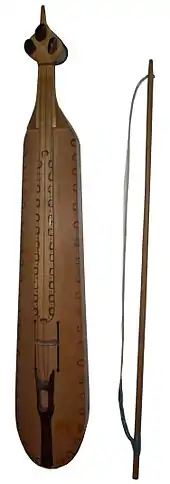Ahenk
The ahenk is a fretless stringed instrument from Turkey, invented by Süleyman Suat Sezgin in 1929.[1] It was designed to be played like the oud. The instrument is similar to a banjo; like the banjo it uses has a reflector bowl as a resonator. On the ahenk, the bowl is made of wood. The front resembles a banjo, with a bridge between the strings and a skin head, similar to that used on a kanun.[1][2] The skin head does not cover the whole front of the instrument, instead the instrument has a wooden front with a hole for the skin, and two or more sound holes.[3] It is similar to the Cumbus by having an adjustable neck, adjusted by turning a wing-nut.[3]
| String instrument | |
|---|---|
| Classification | String instrument |
| Hornbostel–Sachs classification | (Composite chordophone) |
| Developed | Turkey |
| Related instruments | |
| Tanbur | |
Unlike the Cumbus, another Turkish banjo invented in the early 20th century, the instrument has nearly disappeared. There is a renewed interest in the instrument, which is being built in Istanbul and in Eskişehir (where it was invented).[1]
References
See also
- Photo of an ahenk.
- Stringed Instrument Database
- Pictures of the Ahenk
- The Stringed Instrument Database
- ATLAS of Plucked Instruments; there is a picture of the Ahenk under the instrument "cümbüs."
- Site in Turkish about the creation of the instrument
- Website about the Ahenk with pictures.
| External video | |
|---|---|
